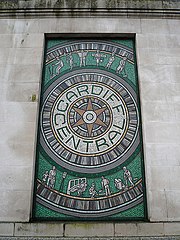| Taff Vale Railway Co v Amalgamated Society of Railway Servants | |
|---|---|
 | |
| Court | House of Lords |
| Decided | 22 July 1901 |
| Citations | [1901] UKHL 1, [1901] AC 426 |
| Case history | |
| Prior action | [1901] 1 KB 170 (CA) and |
| Court membership | |
| Judges sitting | Earl of Halsbury LC, Lord Macnaghten, Lord Shand, Lord Brampton and Lord Lindley |
| Keywords | |
| Right to strike, economic tort, conspiracy | |
Taff Vale Railway Co v Amalgamated Society of Railway Servants [1901] UKHL 1, commonly known as the Taff Vale case, is a formative case in UK labour law. It held that, at common law, unions could be liable for loss of profits to employers that were caused by taking strike action.
The labour movement reacted to Taff Vale with outrage; the case gave impetus to the establishment of the UK Labour Party and was soon reversed by the Trade Disputes Act 1906. It was reversed at common law in Crofter Hand Woven Harris Tweed Co Ltd v Veitch [1942].[1]
- ^ [1942] AC 435